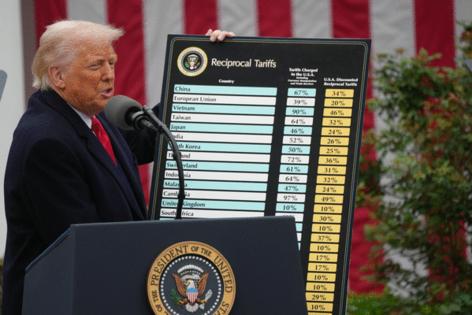Commentary: The hidden moral cost of America's tariff crisis
Published in Op Eds
In the spring of 2025, as American families struggle with unprecedented consumer costs, we find ourselves at a point of "moral reckoning."
The latest data from the Yale Budget Lab reveals that tariff policies have driven consumer prices up by 2.9% in the short term. In comparison, the Penn Wharton Budget Model projects a staggering 6% reduction in long-term GDP and a 5% decline in wages. But these numbers, stark as they are, tell only part of the story.
The actual narrative is one of moral choice and democratic values. Eddie Glaude describes this way in his book “Democracy in Black”: Our economic policies must be viewed through the lens of ethical significance—not just market efficiency. When we examine the tariff regime's impact on American communities, we see economic data points and a fundamental challenge to our democratic principles of equity and justice.
Far too often, the burden of such policies falls disproportionately on those who are least able to bear it. Black Enterprise reports that Black-owned businesses face a dual challenge: economic survival and preserving their role as community anchors.
The average American household is preparing to shoulder an additional $3,800 annual costs. Still, this figure masks a more profound inequity—BIPOC communities and working-class families spend a higher percentage of their income on consumer goods, meaning they bear a disproportionate share of the tariff burden.
The state of our economic solvency is particularly crucial because it intersects with a concept known as the “value gap." The value gap is a premise that white(ness) lives are valued more than others, which Gluade argues remains embedded in our economic and legislative policies. Trump's enacted tariffs' disparate impact on ethnic and uniquely diverse-owned businesses isn't merely coincidental; it reflects more profound structural inequities in our financial system.
Small businesses, particularly those in marginalized communities, face existential threats. According to Small Business Majority, 53% of small companies are concerned about tariffs' negative impacts. These aren't just statistics—they represent community pillars, generational wealth builders, and engines of local economic mobility.
Adherence to a moral imperative requires us to move beyond purely economic calculations. It invites deeply reflective and prophetic questioning of ourselves and our systems. We must ask: What kind of society do we wish to be? How do our trade policies reflect our values? The answer lies not in protectionist rhetoric but in "democratic practices"—policies that strengthen communities rather than fracture them.
Many economists forecast that 72% of small businesses anticipate higher prices; we are not just seeing market dynamics at work. The country is witnessing the erosion of community resilience, the narrowing of economic opportunity, and the weakening of social bonds that sustain democratic life. Finding sound solutions requires reimagining our economic policies through a moral lens and prioritizing equity and community well-being. Hence, developing trade policies that:
— Recognize the interconnected nature of economic justice and democratic health
— Account for disparate impacts on marginalized communities
— Support rather than undermine local economic ecosystems
— Prioritize long-term community stability over short-term political gains
The potential impact of the proposed tariff on U.S. communities and consumers could not result in economic consequences. Such tariffs bring to bear a moral crisis that demands a response grounded in principled and practical solutions. Pathways forward are possible with increased economic adjustments; they fundamentally rethink how we value community, equity, and democratic participation in financial decisions. A democracy's economy ought to be more than just market efficiency. It should be morally courageous and committed to shared prosperity.
Fierce debate over Trump-era tariffs transcends mere spreadsheets and GDP calculations. It is not an argument about trade deficits or quarterly economic indicators—it's a mirror reflecting our national identity and core values.
When leaders indiscriminately slap tariffs on steel from Canada or solar panels from China, we're not just adjusting numbers on a balance sheet but making profound statements about how we view our place in the global community.
Unfortunately, protectionist policies often hit hardest in unexpected places: the main street's mom & pop shops, rural American manufacturers who can't afford higher material costs, the local farmer watching crops rot because their usual markets have vanished, or the single parent facing steeper prices at the grocery store.
Instead of retreating behind economic walls, policies that match the complexity of our times are essential—policies that protect American workers while staying true to our traditions of innovation, fair play, and economic opportunity for all.
We are left to choose between continuing in a direction that exacerbates economic inequality and community fragmentation or embracing a vision of monetary policy as a moral practice that strengthens our democratic fabric while ensuring no community bears an unjust burden in our pursuit of economic security.
____
Rev. Dr. F. Willis Johnson is a spiritual entrepreneur, author, scholar-practioner whose leadership and strategies around social and racial justice issues are nationally recognized and applied.
_____
©2025 The Fulcrum. Visit at thefulcrum.us. Distributed by Tribune Content Agency, LLC.

























































Comments